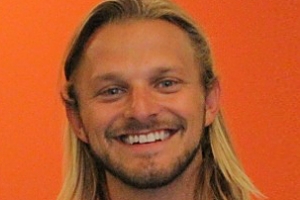Alumnus Draws On Personal Experience to Help Fellow Veterans
February 19, 2013 / by Cursta McCullom- Alumni
Before learning about the USC School of Social Work’s master’s degree program at a graduate school fair, Nicholas Borrelli had never given the field of social work a second thought, nor had he expected it to change the course of his life.
Borrelli grew up in a military family with a father in the U.S. Marine Corps. So, enlisting in the military was second nature to Borrelli.
“I loved G.I. Joe when I was a kid, and I wanted to be a real American hero,” he said. “I wanted to serve my country.”
But Borrelli’s experience as a Marine may have been more than he bargained for.
While he achieved some success – Borrelli became a captain by the time he was 23 – he also deployed to Iraq twice. He described the privilege of serving and being a leader as “crazy,” “scary” and “amazing,” but after he returned from Iraq for the second time, Borrelli knew he didn’t want to be sent into combat again.
Making the decision to pursue a life outside of the military was just the beginning of the challenges Borrelli faced. During his transition back into civilian life, excessive drinking and destructive behavior consumed him. Looking back on that time, Borrelli said he doesn’t know where he would be now if he had gone through that emotional battle alone.
The support Borrelli received from his family, friends and the military is what motivated him to aid veterans making the same journey. After attending the USC School of Social Work, Borrelli, MSW ’12, developed a peer mentorship program to help veterans readjust to civilian life. The program guides them back into the workforce by providing funded internships, organizing networking events and partnering with companies that can advise them about their new career paths.
“The military feeds you, pays you, does your medical work and has many redeeming qualities,” Borrelli said. “It’s very difficult to do something different after coming from an organization that has structure and camaraderie built into your life.”
Isaac Ford, assistant director of military recruitment and diversity outreach for the USC School of Social Work, agrees that one of the greatest challenges veterans face after serving is finding a job, but through reintegration programs such as Borrelli’s, they can get the help they need while adapting to a new life. He also said that the school’s Master of Social Work program, which includes a military social work specialization, is also a beneficial opportunity for veterans because it allows them to serve those they have a connection with.
“Whether you are a veteran or a family member of a veteran, you can relate to the challenges that confront returning service members,” said Ford, who is a veteran himself. “We have witnessed how combat and other related experiences can affect not only the veteran but also our loved ones. Graduates of USC’s MSW program are trained to positively impact returning veterans and their families throughout their post-service lives.”
The school was the safety net Borrelli needed after he decided to leave the Marine Corps. At first his desire to serve others led him to become a teacher, but he soon realized that social work was the better path because it allowed Borrelli to maintain his individuality and exercise his passion for serving those in the military.
During his first year in the MSW program, Borrelli made an impact at the school as one of the first students to do fieldwork on behalf of Building Capacity in Military-Connected Schools, a $7.6 million project funded by the Department of Defense Education Activity. The partnership between the USC School of Social Work and eight San Diego-area public school districts aims to improve the climate of civilian schools, making them more welcoming of military children and their parents and supportive during the frequent transitions these families face.
Borrelli conducted one-on-one counseling with numerous students at San Onofre Elementary School, a Marine Corps base school at Camp Pendleton. Sharing similar childhood experiences with the military-related students, Borrelli tried to be “a voice for the kids.”
“I took on more cases than I was supposed to because it was so hard to turn down kids who needed the support,” he said. “But I feel like a professional now. I feel like now I can speak intelligently about veteran services and the condition of veterans.”
Soon after completing the MSW program at the San Diego Academic Center, Borrelli became a full-time social worker with the Travis Manion Foundation, where he established the peer mentoring program and works as a veteran outreach and support manager. Named after a Marine who died in Iraq in 2007, the organization supports families of fallen soldiers and builds a community for veterans through fundraisers, service projects and dedications. He also volunteers as a counselor and instructor for surf therapy programs that encourage the healing of the physical and emotional injuries veterans suffer after combat.
Since community is an essential characteristic of the military, Borrelli firmly believes that connecting with people after serving can have the power to eliminate the isolation veterans experience after leaving the military, which contributes to the increasing number of suicides among them. Through his peer mentorship program, he hopes to establish the kind of trust that will help prevent fellow veterans from going down the kind of self-destructive path he took.
“It’s difficult to acclimate to a society that doesn’t understand you, what you’ve done and what you’ve come from,” he said. “If you sacrificed part of your life, you should have the capacity and the opportunity to pursue your passions and do what you want to do after service.”
To reference the work of our faculty online, we ask that you directly quote their work where possible and attribute it to "FACULTY NAME, a professor in the USC Suzanne Dworak-Peck School of Social Work” (LINK: https://dworakpeck.usc.edu)
